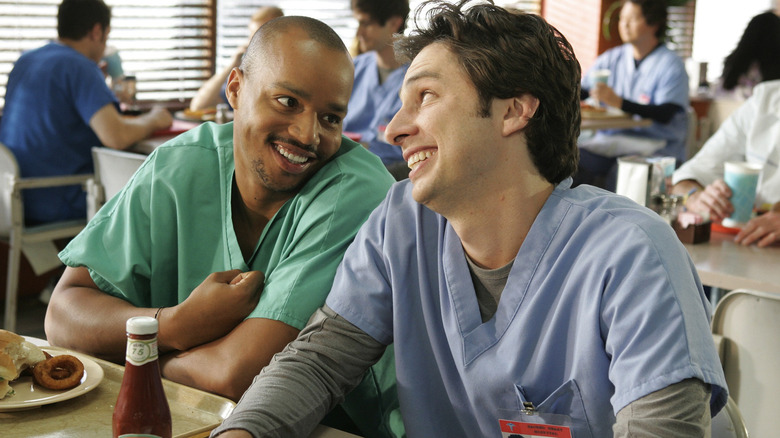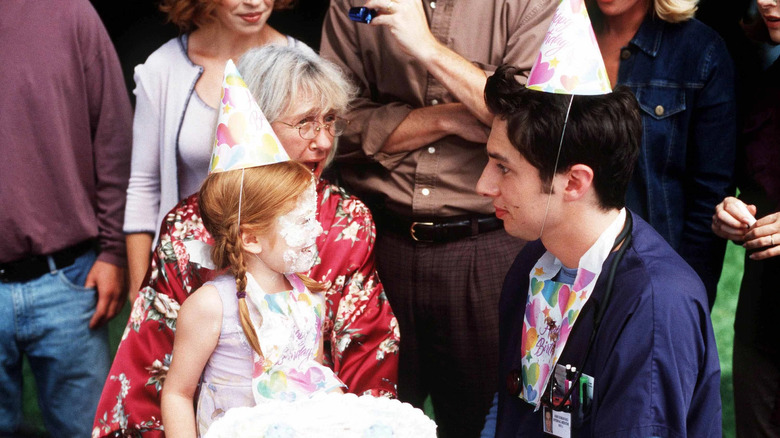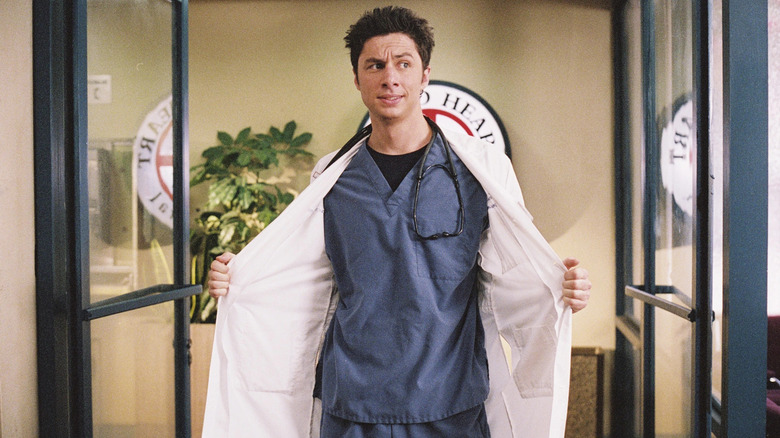Bill Lawrence Wasn't Betting On Scrubs Getting A Second Season
As beloved as "Scrubs" is today, nothing about its premise guaranteed success. It's a sitcom about a setting that's usually reserved for serious dramas, with no laugh track or multi-camera set-up. Although a sitcom without a laugh track wasn't unheard of at the time (the very successful "Malcolm in the Middle" aired its debut season the year before), it still wasn't the norm.
The biggest reason for showrunner Bill Lawrence's skepticism over the show's survival, however, was his willingness to regularly take its episodes in sad, serious directions. Just like in real life, patients would die at Sacred Heart Hospital, and "Scrubs" would rarely try to interrupt the tragedy with any light-hearted quips to ease the tension.
Push back from the network
Specifically, Lawrence received a lot of push back for season 1's fourth episode, "My Old Lady," which followed JD, Elliot, and Turk as they all dealt with patients who had life-threatening illnesses. JD's narration tells us in the beginning that "one out of every three patients that's admitted to this place will die here." As the episode goes on, viewers watched in suspense to find out which patient would die, only to be reminded that general statistics don't actually apply to specific situations. All three patients die, and our three interns simply have to make peace with that.
"We all thought we were going to be canceled after one year," Bill Lawrence explained at the 2022 ATX Festival. The early inclusion of "My Old Lady," an episode that was far more serious than you'd ever expect from a sitcom, certainly didn't help. When Lawrence told the folks at NBC what would happen, their response was, "'Can just one of them die?' And I said no, they all have to die. 'Can they all be kinda racist so we're happy they die?' No, no."
Somehow the episode got to air in its intended form anyway, and it turned out to be one of most well-regarded of the series. It was the episode that set the tone for the rest of the show, letting audiences know that for all the wacky fantasy sequences and all of Dr. Cox's absurdly long-winded rants, they could expect things to get dead serious at a moment's notice. Who knows if beloved episodes like "My Screw Up" or "My Long Goodbye" could've happened if the show's first attempt at dark ending hadn't been as successful as it was.
Evolving past season 1
Sure enough, "Scrubs" got its second season, which meant the show had to change a little if it wanted to last long-term. The most obvious example of this is how the Janitor was originally intended to be a figment of JD's imagination. It was a fun idea for a few episodes, but it severely limited the amount of storylines they could give to the character. Seemingly as soon as it became clear they were getting renewed, "Scrubs" started letting the Janitor interact more with the other characters, which was clearly the right choice: Neil Flynn bounces just as well off of any of the other cast members.
Another big change was they slowly dropped any hint of the Dr. Cox/Carla/Turk love triangle of the first season. Season 1 explicitly told us a couple times that Cox was in love with Carla, but by the end of season 2, it's easy to forget that any of that ever happened. Much like the attempt in "That '70s Show" at an Eric/Donna/Hyde love triangle in its first season, this was one of those weird early storylines that clearly wasn't working, and we'd all be better off if we just pretended it never happened.
But for the most part, the changes going into season 2 were pretty subtle. The lighting got a little brighter, the jokes got a little sharper. By season 3, "Scrubs" was firing on all cylinders, playing a delicate balance with comedy and tragedy and making it look easy. None of it could've happened if the show hadn't take those risks in its first season, or if NBC had stopped them from doing so. Lawrence may not have expected "Scrubs" to get a second season, but we're all grateful it did.


